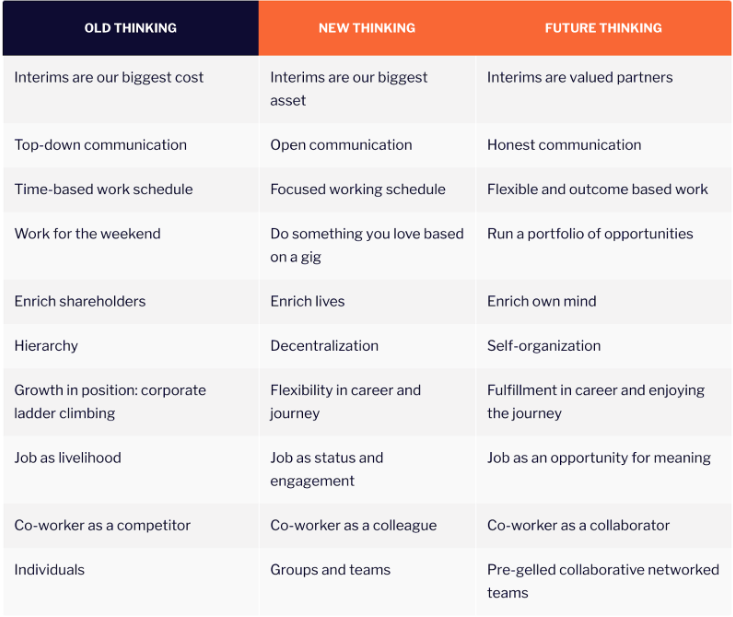As we look towards the future of work, companies need to be adapting their mindset and embracing the power of the gig economy and interim workforce.
Our founder Pat Lynes wrote an exclusive feature for Go Catalant on how the business landscape is changing and the benefits of utilising the interim world for both corporates and individuals alike. Check out Pat’s thoughts below…
That was then, this is now
To cope with today’s rate of change, companies need specialist knowledge and skills representing a diverse range of experiences, but it’s not sustainable to hire people for every new idea. As businesses face increasingly complex and domain-specific issues, they need the right talent — and they need it yesterday.
This has caused a shift across the economy, at its heart, changing the way we conceptualize work. Let’s take a look at some workplace key trends:

While companies discover the need to tap into this talent to keep up, let alone stay ahead, people with specialised skills have simultaneously discovered that a flexible work-life balance is no longer a pipe dream. Enter: the ‘gig economy.’
A Win-Win for Industries & Individuals
The gig economy indicates, simply, the trend away from a job for life towards flexible working engagements. By leveraging the gig economy, companies can contract independent workers for short-term projects on an as-needed basis.
Over the last few years, through the success of online talent marketplaces, what first became widespread through rideshare apps and websites allowing you to hire someone to assemble your IKEA furniture moved up into the white collar market to include what I call the knowledge and executive gig economy.
For these knowledge workers, the gig economy gives them the freedom to choose flexibility and dictate their own terms, directly tackling key client issues without the unnecessary constraints of formal employment. The on-demand specialist gains control over their work-life balance with the ability to work from anywhere during hours that fit their lives, and allows them to choose the work they most enjoy. As more people build portfolio careers out of the projects they partake (and excel) in, non-executive directors (NEDs), C-Suite executives, and others across the management ladder are embracing the contingent workforce.
But, flexible employment structures not only benefit the worker; they also provide an enormous benefit to enterprises. Your company, now with easy access to specific strategic expertise that would be unaffordable to maintain on staff, is able to increase speed to market and improve innovation into projects. This provides you with unprecedented agility to scale based on shifting market trends, strategic initiatives, or other imperatives without the constraints of a traditional workforce or even geographic boundaries of where the best talent sits.
A Look Into the Future
The gig trend has picked up speed over the past decade and will continue to grow. Workers under the age of 35 are indicating a preference to work independently on a project-by-project basis. Workers over the age of 35 are indicating that they want to take their IP, experience and value to the freelance market. In fact, many recruitment experts predict that 40 percent of people will be self-employed by 2020, and a recent Way We Work survey (gated asset) of 9,000 knowledge workers by Unify revealed that 52 percent already work in virtual teams.
Surrounding this nucleus of change is an enabling environment that further drives these shifts. The rise in cloud computing and usage of technologies, such as Skype and Zoom, along with an increase in products and services aimed at the self-employed, all enable virtual working. As these technologies become more embedded in the working process, the barrier to flexible arrangements is increasingly chipped away.
“Fortune favors the brave” says a Latin proverb and, in the new world of work, fortune favours those with needed skill sets and expertise, as well as the smart companies who value that top talent sufficiently to hire them on-demand. This transformation is here to stay, and ultimately, it will benefit everyone involved. Let’s move beyond the pull of the consulting badge to look at talent for what talent is worth.





































































